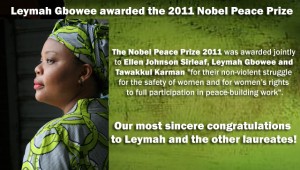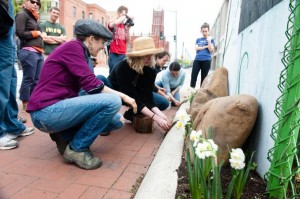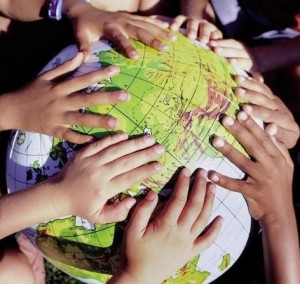By wogwpa1358 on October 11, 2011 / Leadership
Tags:
africa,
Leymah Gbowee,
Nobel Peace Prize goes to women's rights activists,
Pray the Devil Back to Hell,
President Ellen Johnson Sirleaf,
social change,
social justice,
Tawakkul Karman,
Wangari Maathai,
women of green,
women's leadership

OSLO, Norway (AP) — The Nobel Peace Prize was awarded to three champions of women’s rights in Africa and the Middle East on Friday in an attempt to bolster the role of women in struggles to bring democracy to nations suffering from autocratic rule and civil strife.
The Norwegian Nobel Committee split the prize between Tawakkul Karman, a leader of anti-government protests in Yemen; Liberian President Ellen Johnson Sirleaf, the first woman to win a free presidential election in Africa; and Leymah Gbowee of Liberia, who campaigned against the use of rape as a weapon in her country’s brutal civil war.
By picking Karman — the first Arab woman to win the peace prize — the Norwegian Nobel Committee found a way to associate the 10 million kronor ($1.5 million) award with the uprisings sweeping North Africa and the Middle East without citing them alone, which would have been problematic.
After a popular uprising at the height of the Arab Spring, Libya descended into civil war that led to NATO military intervention. Egypt and Tunisia are still in turmoil. Hardliners are holding onto power in Yemen and Syria and a Saudi-led force crushed the uprising in Bahrain, leaving an uncertain record for the Arab protest movement.
Prize committee chairman Thorbjoern Jagland said it was also difficult to identify the leaders of the Arab Spring among the scores of activists who have spearheaded protests using social media.
“We have included the Arab Spring in this prize, but we have put it in a particular context,” Jagland told reporters. “Namely, if one fails to include the women in the revolution and the new democracies, there will be no democracy.”
He called the oppression of women “the most important issue in the Arab World” and stressed that the empowerment of women must go hand in hand with Islam.
“It may be that some still are saying that women should be at home, not driving cars, not being part of the normal society,” he told The Associated Press. “But this is not being on the right side of history.”
He noted that Karman, 32, is a member of a political party linked to the Muslim Brotherhood, an Islamist movement sometimes viewed with suspicion in the West. Jagland, however, called the Brotherhood “an important part” of the Arab Spring.
No woman or sub-Saharan African had won the prize since 2004, when the committee honored Wangari Maathai of Kenya, who mobilized poor women to fight deforestation by planting trees. She died last month at 71. The 2005 prize went to the International Atomic Energy Agency and its head Mohamed ElBaradei of Egypt.
Sirleaf, 72, became Africa’s first democratically elected female president after winning a 2005 election in Liberia, a country created to settle freed American slaves in 1847.
Fighting began in 1989, when Charles Taylor’s National Patriotic Front of Liberia rebel group launched an armed uprising. His forces and rebel fighters were charged with looting Liberia’s small diamond reserves to buy arms, along with smuggling gems from Sierra Leone’s more expansive diamond fields for export through Liberian ports.
Continue reading... →


